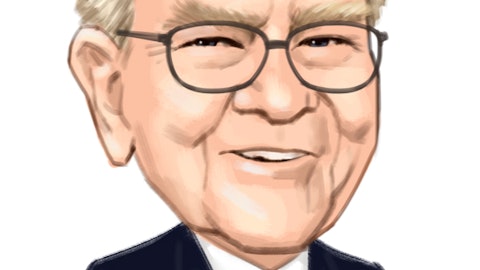Frank Svoboda: Yes, Ryan, with respect to admin expenses, we do see those probably ticking up just a little bit as a percentage of premium maybe getting closer to 7% for the year. We’re seeing continued investments in our IT operations, plus we have some additional depreciation from some projects that were in place and then we’re seeing probably a higher expectations around some postage increases for the year that are probably driving as a percentage up a little faster than what we’re seeing in premium growth with respect to that. Yes. So with the lower excess cash flow as well as lower excess liquid assets at the parent, because we’re just slightly above that $50 million to $60 million that we target. We’d expect the amount available to shareholders would be lower in 2024 than what was in 2023. And the year is not final, so we don’t have our final statutory for the year, but we’d expect repurchase to be in the range of $325 million to $350 million.
Ryan Krueger: Thanks. And then just how much is the $400 million of free cash flow, how much is that being depressed by things like credit losses and excess mortality that has occurred in 2024? Just trying to think about what that would be, I guess, when you roll forward a year to a more normalized level.
Frank Svoboda: Yes. It’s not the only thing, but it’s about $50 million for the credit losses. And then we’ve had quite strong sales growth in the year, that adds a little bit of strain as well. So it’s really kind of those two factors.
Ryan Krueger: Okay. Great. Thanks. And then just if I could sneak in one last one, I just wanted to clarify on mortality. I guess am I reading this correctly that you’re still seeing some level of excess mortality, but it’s better than the excess mortality that you had assumed in your projections this year?
Tom Kalmbach: It is better than – so yes, yes on both accounts. We are still seeing excess mortality. Good thing is we’ve seen deaths from cancer and heart and circulatory disorders come down a bit. Those are still higher than where we had seen them historically, so they’re still elevated. And the second part of your question was on the – what was the second part there?
Ryan Krueger: I was just saying that you have already assumed excess mortality in the near-term in your cash flow assumption. So you’re seeing excess mortality, but it’s not as bad as what you had already assumed. Is that right?
Tom Kalmbach: Yes. That’s correct. And you can see that in the re-measurement gains to the extent that we have lower obligations due to fluctuations, that’s indicative of favorable mortality or lapse experience. And so you can see that kind of historically. And then if you backed out the assumption changes that were made in the third quarter 2022 and 2023, you can see that we’re coming in a little bit favorable from what our underlying assumptions are.
Ryan Krueger: Thanks a lot.
Frank Svoboda: Yes. One of the things I would just add to that, Ryan is that like Tom said, so we are seeing the actual experience coming in a little bit lower than those of the expectations. They’re still running a little bit elevated as Tom indicated, but we are seeing some positive trends in like in that, just like what we thought. But we – I kind of think about those fluctuations the way we’ve always had fluctuations, it’s just that difference between assumptions and that actual experience really hasn’t had a change so far in our long-term expectations and that’s what’s really driving the assumption changes. So even though we’re seeing some positives in the near-term, we really want to, and I think Tom mentioned this, we really want to see some of that stick around for a while longer before we start to think is there really anything different that we need to think about with respect to the long-term assumptions.
Ryan Krueger: Got it. That’s helpful. Thank you.
Operator: The next question comes from a line of Maxwell Fritscher from Truist Securities. Please go ahead.
Maxwell Fritscher: Hi, good morning. I’m calling in for Mark Hughes. A similar question was asked last quarter, but I just wanted to get your updated broad outlook on recruiting with agent count being up in all channels and the labor market still being tight.
Matt Darden: Yes. What we historically have seen and continue to see with this economic cycle is that we are able to recruit strongly in these type of environments, and I think that’s shown in 2023. And we anticipate that momentum carrying forward in 2024. As a reminder, we’re not recruiting individuals that are unemployed. We’re really recruiting people that are looking for a different and better opportunity, particularly an entrepreneurial opportunity. And inflation actually can be helped to us in that fact is that we provide an opportunity where folks are more in control of their income based on their activity and output. And so they have an opportunity to make more money than maybe a fixed income job that they’re currently in.
So we see strong recruiting growth associated with that. The other thing that we see is people want an opportunity to have flexibility. And as you see more and more companies announcing return to the office and some of those type of scenarios, we’re seeing more people being attracted to the flexible opportunity that we provide in that more entrepreneurial opportunity. And I just point to, we go back and look at how have we performed during other economic cycles. American Income, as an example had double-digit growth in 2002, 2008 and 2009 also had double-digit growth. And so during those economic cycles, we typically see very strong recruiting growth, which translates into the strong sales growth. So anticipate that moving forward into 2024 as well.
Maxwell Fritscher: Thank you. And sorry if I missed it, but did you guide to a full year 2024 agent count number?
Matt Darden: No. We typically don’t do that on this particular call. We really want to see how the fourth quarter comes out because that agent count trend and the momentum that we have in the fourth quarter really determines how the rest of the year shakes up. So we generally discuss that on our next call.
Maxwell Fritscher: Okay. That’s all I have. Thank you very much.
Operator: Next question comes from the line of Tom Gallagher from Evercore ISI. Please go ahead.




